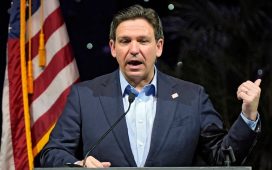Energy suppliers should renegotiate fixed contracts with smaller UK businesses to reflect the sharp drop in wholesale prices in recent months or thousands of companies will struggle to stay afloat, the Federation of Small Businesses has warned.
The call by the trade body, which represents 150,000 small and medium-sized enterprises in the UK, comes after thousands of companies signed fixed contracts in the second half of last year when energy prices were at their peak.
But since then wholesale natural gas prices have fallen more than 80 per cent, and the government has sharply reduced support for businesses since the end of the winter, despite many companies being stuck on higher-cost fixed deals.
The FSB has called on the government and energy regulator Ofgem to support what they call a move to “blend and extend” contracts, warning that 93,000 businesses faced closure or cutbacks because of the size of their energy bills.
“Having come out from a tough winter, this spring is supposed to be the beginning of economic recovery, but tens of thousands are still very much in survival mode because they are tied in to sky-high energy contracts,” said Tina McKenzie, FSB policy chair.
“There are signs that small businesses may be about to turn a corner after last year’s downturn. Giving small firms a way out of last year’s market peak rates will accelerate the progress to recovery.”
Energy prices soared last year as Russia cut natural gas supplies to Europe as part of its full-scale invasion of Ukraine, with UK prices peaking at more than £6 a therm in August 2022.
While prices remain relatively high by historical standards, they have still fallen sharply, with the wholesale price hitting a 22-month low on Friday of 80 pence a therm for delivery next month. Contracts for delivery in winter 2023/24 are higher but are still down to about £1 a therm.
Energy UK, the industry body, acknowledged it was “in suppliers’ interests to ensure their customers can afford their bills” and said many were already “offering to renegotiate and extend existing contracts where this is possible”.
But they cautioned that energy suppliers had also often bought the energy in advance to hedge their exposure to the fixed-term contracts signed with businesses last year.
“When contracts have been agreed and signed, energy is purchased at the prevailing market rates on behalf of the customer — meaning it is a commercial decision for the supplier concerned whether they can offer such flexibility.”
The government said contract negotiations were “ultimately a matter for suppliers and their customers” but added that it was holding “regular discussions with them and Ofgem to make sure businesses get a fair deal”.
The government said it had spent £5.9bn to date, or £30mn a day, to shield businesses from as much as half of their wholesale energy costs over the winter.
Ofgem said that while it could not “unpick private contracts”, it wanted “to see commercially sensible solutions that help non-domestic customers”, adding that it had recently written to suppliers asking them “to show flexibility”.
“We will continue to press suppliers on this, while we review the regulation of the non-domestic market more broadly,” Ofgem added.
The FSB said any company that signed a contract in the second half of last year should be allowed to renegotiate its energy supply contract if the price it was paying was higher than during the winter months when more generous government support was in place.












